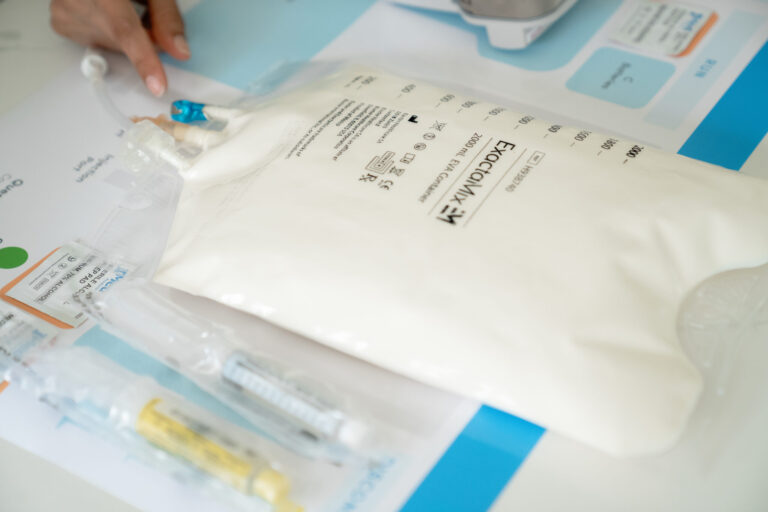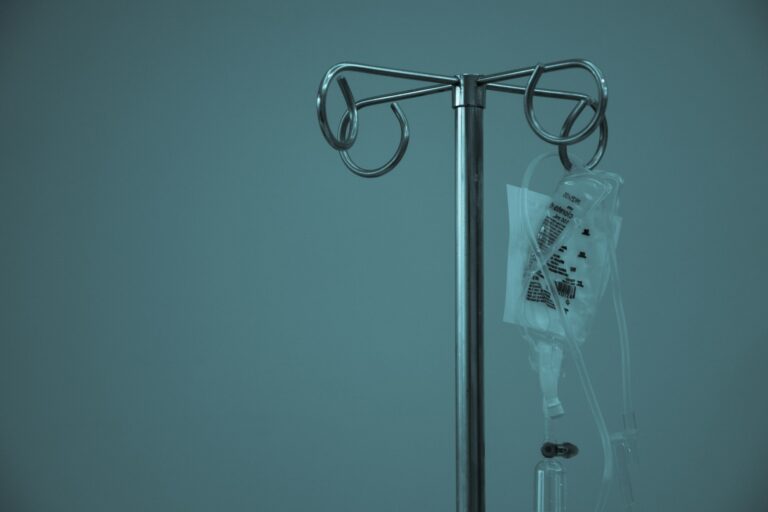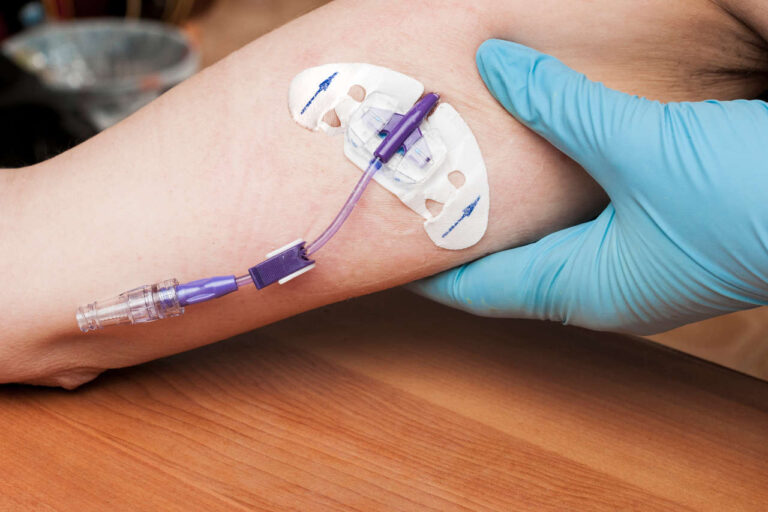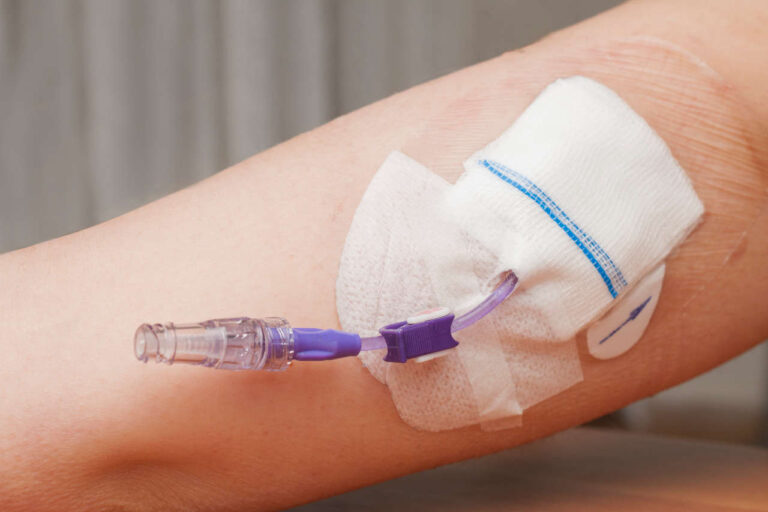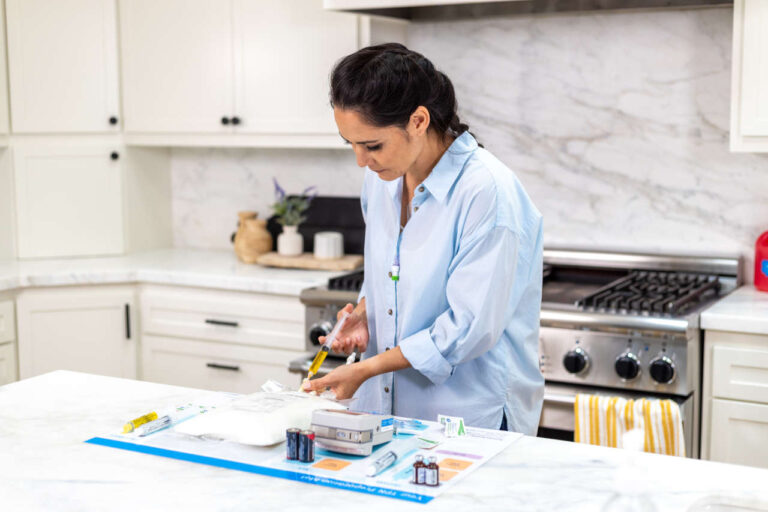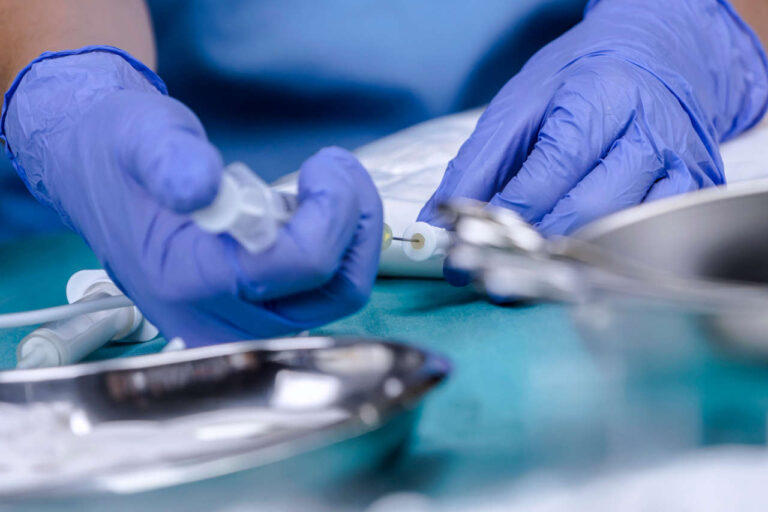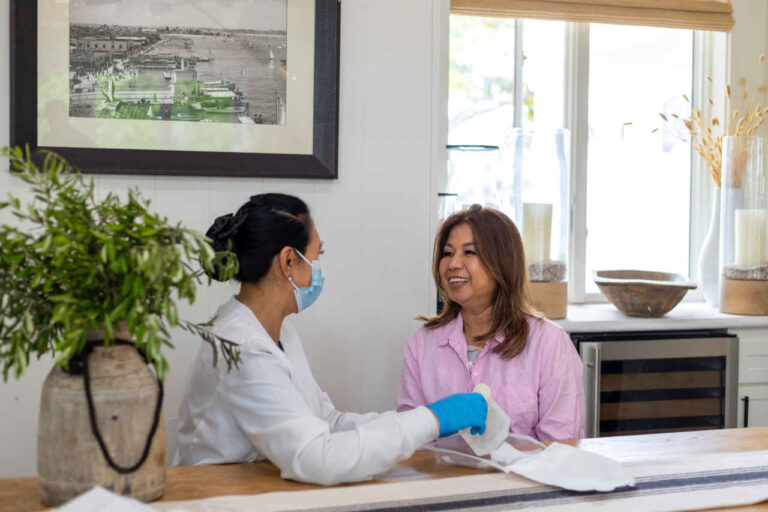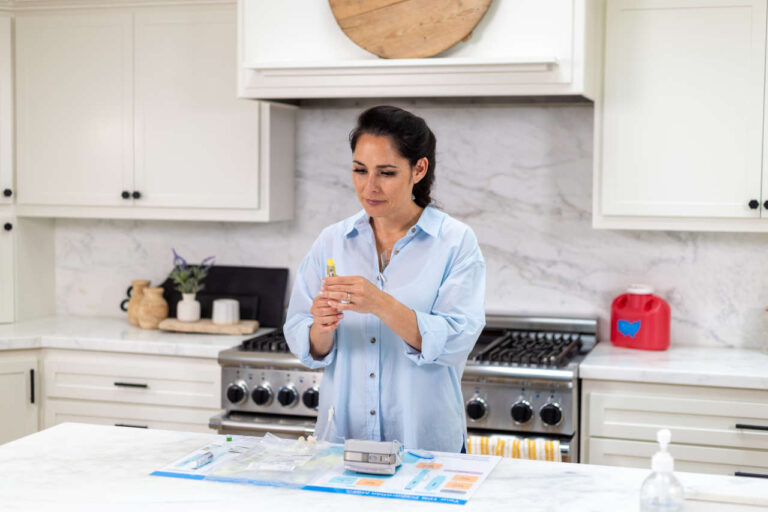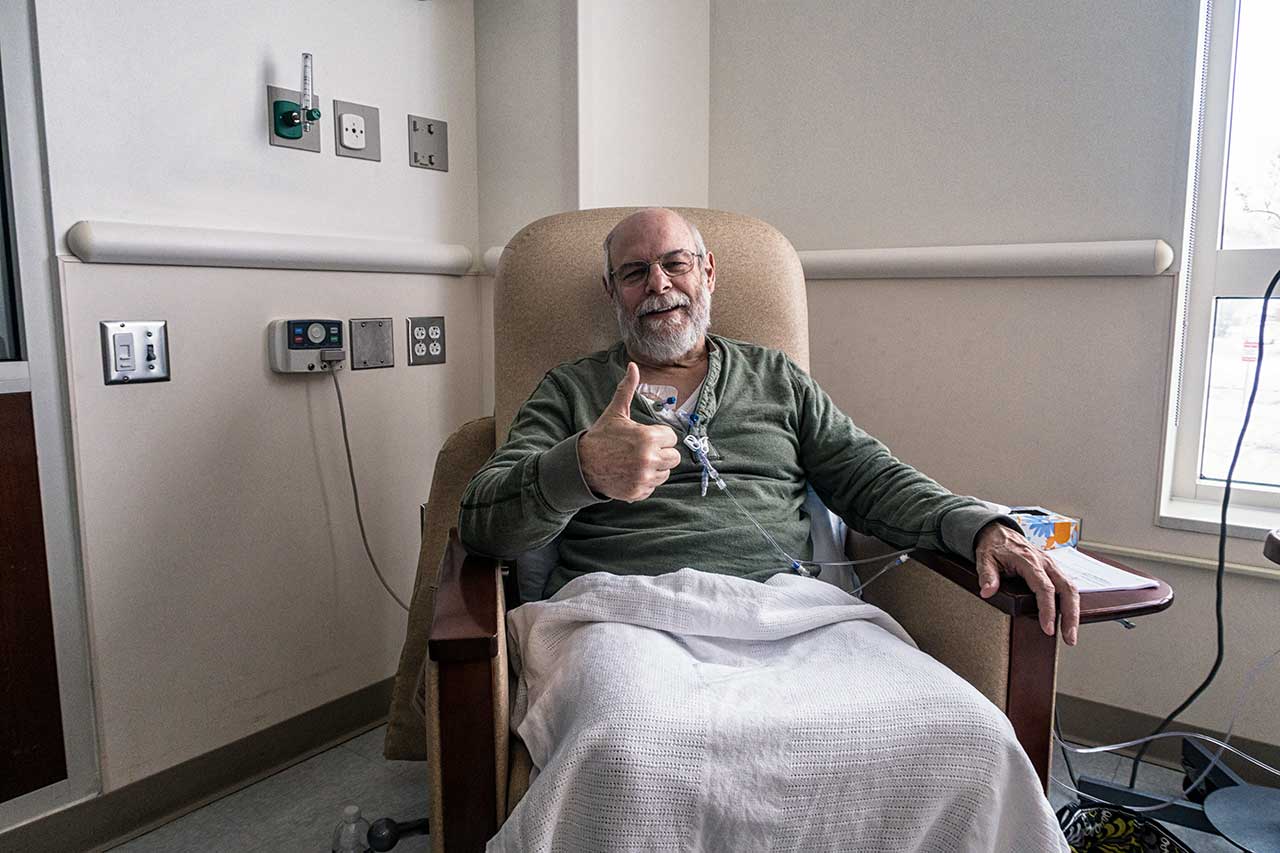
Dinh dưỡng qua đường tĩnh mạch hoàn toàn (TPN) là một phương pháp thay thế để đáp ứng nhu cầu dinh dưỡng hàng ngày mà không cần can thiệp vào hệ tiêu hóa. Dinh dưỡng ngoài đường tiêu hóa hoàn toàn cung cấp dinh dưỡng dạng lỏng cho hệ tuần hoàn thông qua một đường truyền trung tâm đặt ở ngực hoặc cánh tay trên.
Dịch truyền tĩnh mạch của bạn, luôn có sẵn
Hàng tồn kho đầy đủ, truy cập dễ dàngTPN cung cấp cho cơ thể các dưỡng chất cần thiết, bao gồm carbohydrate, vitamin, khoáng chất, chất điện giải, nước, chất béo và protein. Các chuyên gia dinh dưỡng thường khuyến nghị dinh dưỡng đường tĩnh mạch hoàn toàn cho người mắc các rối loạn đường tiêu hóa (hệ tiêu hóa không có khả năng phân hủy thức ăn rắn).
Các rối loạn tiêu hóa bao gồm cắt dạ dày, rò, hội chứng ruột ngắn, Bệnh Crohn, ung thư đường tiêu hóa, suy ruột, tắc ruột và nhiều bệnh khác nữa.
Những điều cần biết khi bắt đầu nuôi dưỡng toàn bộ qua đường tĩnh mạch: Lợi ích và các biến chứng có thể xảy ra
Bạn có thể được nuôi dưỡng hoàn toàn qua đường tĩnh mạch trong nhiều ngày, nhiều tuần hoặc bất kỳ khoảng thời gian nào khác theo chỉ định của bác sĩ. TPN là một phương pháp điều trị tuyệt vời cho những người mắc các rối loạn tiêu hóa hoặc bệnh nhân ung thư gặp khó khăn khi nuốt. Dưới đây, chúng ta sẽ xem xét kỹ hơn những điều cần lưu ý khi bắt đầu sử dụng TPN.
Không đau khi đặt ống thông
Ý tưởng đặt ống thông vào tĩnh mạch nghe có vẻ đáng sợ, nhưng may mắn thay, bạn sẽ hầu như không cảm thấy đau khi ống thông được đưa vào cơ thể. Bạn cũng sẽ không cảm thấy đau khi truyền dịch dinh dưỡng qua ống thông.
Nguy cơ nhiễm trùng thấp
Bác sĩ sẽ sử dụng ống thông vô trùng và bạn sẽ không bị nhiễm trùng khi sử dụng TPN.
Bạn có thể tiếp tục các hoạt động hàng ngày của mình

Đường dây trung tâm thường dễ che giấu bằng cách mặc áo, đó là lý do tại sao chúng rất phổ biến. Bạn có thể luồn đường dây qua áo và cất vào túi xách hoặc ba lô. Bằng cách này, bạn có thể tiếp tục các hoạt động hàng ngày mà không ai biết bạn đang nhận TPN. Lịch trình quản lý có thể được điều chỉnh theo nhu cầu của bạn.
Biến chứng có thể xảy ra
Rất hiếm khi gặp tác dụng phụ từ TPN. Tuy nhiên, một số biến chứng có thể xuất hiện theo thời gian. Chúng bao gồm:
- Mất cảm giác thèm ăn
- Tăng đường huyết (lượng đường trong máu cao)
- Hạ đường huyết (lượng đường trong máu thấp)
- Huyết khối của ống thông đường hầm (tắc nghẽn lưu thông máu)
- Tăng men gan
- Mất nước
- Mất cân bằng điện giải
- Thiếu hụt một số vi chất dinh dưỡng (thường là khoáng chất và vitamin)
Nếu bạn nhận thấy bất kỳ biến chứng nào trong số này, đừng ngần ngại thông báo cho bác sĩ. Ngoài ra, hãy kiểm tra sức khỏe định kỳ để đảm bảo bạn không dễ bị nhiễm trùng. Việc sử dụng TPN có thể gây áp lực về mặt cảm xúc, nhưng bạn vẫn có thể sống tích cực nếu biết cách thích nghi với cuộc sống của bạn với TPN.
Nếu bạn đang cân nhắc điều trị bằng TPN cho bản thân hoặc người thân, hãy dành thời gian tìm hiểu kỹ các lựa chọn. Đừng ngại đặt câu hỏi; khi nói đến sức khỏe, bạn xứng đáng được hiểu đầy đủ về các thông tin này.
Chăm sóc đặc biệt AmeriPharma®
Dinh dưỡng qua đường tĩnh mạch toàn phần | Dẫn đầu trong hỗ trợ TPNTầm quan trọng của phòng thí nghiệm trong TPN
Do bản chất của TPN và những tác động mà nó muốn đạt được, việc thử nghiệm liên tục trong phòng thí nghiệm là rất quan trọng.
Trước hết, cần phải xét nghiệm để xác định lượng chất dinh dưỡng và chất điện giải cần thiết cho cơ thể. Việc điều chỉnh các chất dinh dưỡng này là chức năng của hệ tiêu hóa. Tuy nhiên, vì hệ thống này không hoạt động bình thường đối với bệnh nhân mắc hội chứng TPN, các chuyên gia chăm sóc sức khỏe xử lý dinh dưỡng qua đường tĩnh mạch cần đảm bảo bệnh nhân nhận được lượng chất dinh dưỡng lý tưởng và chính xác mà cơ thể cần.
Trong quá trình điều trị, cần đảm bảo cơ thể đáp ứng hiệu quả với liệu pháp TPN. Cách duy nhất để đạt được điều này là thông qua xét nghiệm. Bác sĩ sẽ kiểm tra nồng độ glucose, nồng độ điện giải và các chất dinh dưỡng quan trọng khác giúp cơ thể hoạt động tối ưu.
Họ cũng sẽ kiểm tra các cơ quan khác liên quan đến dinh dưỡng để xác nhận rằng chúng không bị ảnh hưởng tiêu cực bởi phương pháp điều trị TPN. Các cơ quan này bao gồm gan, tuyến tụy và các cơ quan liên quan đến tiêu hóa khác.
Các chỉ số xét nghiệm khác được kiểm tra trong quá trình thực hiện TPN bao gồm canxi, điện giải, công thức máu, transferrin, nitơ urê máu, triglyceride và kali. Các xét nghiệm này rất đơn giản và không gây đau đớn. Do đó, bệnh nhân nên chuẩn bị cho các xét nghiệm TPN giống như cách họ làm với các xét nghiệm thường quy.
Đừng ngần ngại báo cáo bất kỳ sự khó chịu hoặc thay đổi nào trong quá trình điều trị. Bằng cách này, bạn sẽ hướng dẫn người chăm sóc hoặc chuyên gia chăm sóc sức khỏe của mình thực hiện đúng các xét nghiệm cần thiết.
Chăm sóc và bảo trì đường dây trung tâm
Ống thông và các thiết bị khác liên quan đến việc đưa chất dinh dưỡng vào cơ thể trong nuôi dưỡng ngoài đường tiêu hóa hoàn toàn cần phải được giữ sạch sẽ và vô trùng trong suốt quá trình điều trị. Do đó, điều dưỡng viên hoặc người chăm sóc chuyên nghiệp sẽ đảm nhiệm việc chăm sóc và bảo trì đường truyền trung tâm.
Vật tư tiêu chuẩn TPN
Bạn không nhất thiết phải nhập viện để được điều trị bằng TPN, nhưng hãy nhớ hỏi bác sĩ để biết thêm chi tiết. Trong trường hợp bạn được phép thực hiện TPN mà không cần sự hỗ trợ của chuyên gia y tế, sau đây là những vật dụng cần thiết để giúp bạn duy trì việc thiết lập TPN:
- Máy bơm
- Túi và dây câu TPN
- Khăn lau cồn
- Rào cản vô trùng
- Bộ quản lý dung dịch TPN
- Truyền dịch đa vitamin
- Kim tiêm và ống tiêm
- Hộp đựng vật sắc nhọn
Cách duy trì đường truyền trung tâm trong quá trình điều trị bằng TPN
Trong quá trình thực hiện TPN, việc chăm sóc ống thông tiểu là rất quan trọng để tránh mọi biến chứng. Bác sĩ sẽ tư vấn cho bạn vị trí đặt ống thông tiểu an toàn nhất và loại ống thông tiểu phù hợp để sử dụng.
Ống thông tĩnh mạch trung tâm (CVC) thường được đưa vào qua tĩnh mạch cảnh, với đầu ống thông nằm trong tĩnh mạch chủ trên gần tim. Mặt khác, ống thông trung tâm đặt ngoại vi (PICC) được đưa vào qua tĩnh mạch lớn ở cánh tay trên, với đầu ống thông nằm gần tim.
Để duy trì thông suốt đường truyền trung tâm và ngăn ngừa mọi nhiễm trùng liên quan đến ống thông trong quá trình điều trị bằng TPN:
- Sử dụng nước muối vô trùng để rửa ống thông.
- Che phủ vị trí chọc bằng miếng gạc vô trùng hoặc miếng băng gạc y tế.
- Thay băng gạc trong suốt ít nhất mỗi tuần một lần hoặc khi bị bẩn.
- Liên tục kiểm tra vị trí tiêm để tìm dấu hiệu nhiễm trùng (sưng/viêm, đỏ, chảy dịch).
- Kiểm tra và báo cáo bất kỳ dấu hiệu nhiễm trùng nào.
- Đừng ngần ngại liên hệ với bác sĩ hoặc chuyên gia chăm sóc sức khỏe nếu bạn có bất kỳ câu hỏi nào.
Nói chuyện với chuyên gia về hỗ trợ đồng thanh toán
Những câu hỏi thường gặp
1. Ưu điểm quan trọng nhất của TPN là gì?
TPN là một trong những phương pháp an toàn nhất để điều trị bệnh đường tiêu hóa. Mặc dù có thể có một số tác dụng phụ, nhưng bạn có thể sẽ hồi phục theo thời gian.
2. TPN có tác dụng phụ tiêu cực nào không?
Có. Các tác dụng phụ tiêu cực bao gồm chán ăn, đường huyết cao, hạ đường huyết và nhiều tác dụng phụ khác. Tuy nhiên, những tác dụng phụ này có thể dễ dàng được kiểm soát bằng cách chăm sóc y tế kịp thời.
3. TPN có chữa được bệnh rối loạn tiêu hóa không?
Không, nó không có tác dụng đó. Nó chỉ cung cấp hỗ trợ dinh dưỡng.

